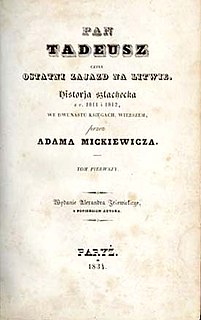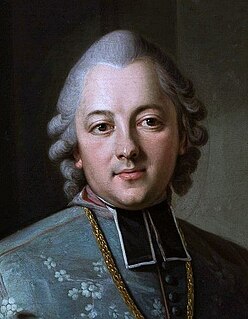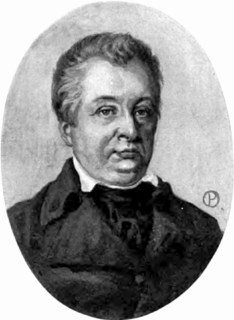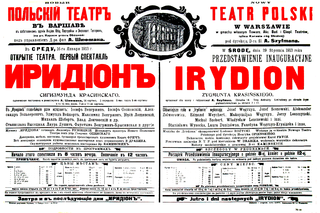
Polish literature is the literary tradition of Poland. Most Polish literature has been written in the Polish language, though other languages used in Poland over the centuries have also contributed to Polish literary traditions, including Latin, Yiddish, Lithuanian, Russian, German and Esperanto. According to Czesław Miłosz, for centuries Polish literature focused more on drama and poetic self-expression than on fiction. The reasons were manifold but mostly rested on the historical circumstances of the nation. Polish writers typically have had a more profound range of choices to motivate them to write, including past cataclysms of extraordinary violence that swept Poland, but also, Poland's collective incongruities demanding an adequate reaction from the writing communities of any given period.

Ignacy Błażej Franciszek Krasicki, from 1766 Prince-Bishop of Warmia and from 1795 Archbishop of Gniezno, was Poland's leading Enlightenment poet, a critic of the clergy, Poland's La Fontaine, author of the first Polish novel, playwright, journalist, encyclopedist, and translator from French and Greek.

Adam Bernard Mickiewicz was a Polish poet, dramatist, essayist, publicist, translator and political activist. He is regarded as national poet in Poland, Lithuania and Belarus. A principal figure in Polish Romanticism, he is one of Poland's "Three Bards" and is widely regarded as Poland's greatest poet. He is also considered one of the greatest Slavic and European poets and has been dubbed a "Slavic bard". A leading Romantic dramatist, he has been compared in Poland and Europe to Byron and Goethe.

Aleksander Głowacki, better known by his pen name Bolesław Prus, was a Polish novelist, a leading figure in the history of Polish literature and philosophy, as well as a distinctive voice in world literature.

Napoleon Stanisław Adam Feliks Zygmunt Krasiński was a Polish poet traditionally ranked with Adam Mickiewicz and Juliusz Słowacki as one of Poland's Three Bards – the Romantic poets who influenced national consciousness in the period of Partitions of Poland. Of the three, he is considered the least influential.

Fables and Parables, by Ignacy Krasicki (1735–1801), is a work in a long international tradition of fable-writing that reaches back to antiquity. Krasicki's fables and parables have been described as being, "[l]ike Jean de La Fontaine's [fables],... amongst the best ever written, while in colour they are distinctly original, because Polish." They are, according to Czesław Miłosz, "the most durable among Krasicki's poems."

Pharaoh is the fourth and last major novel by the Polish writer Bolesław Prus (1847–1912). Composed over a year's time in 1894–95, serialized in 1895–96, and published in book form in 1897, it was the sole historical novel by an author who had earlier disapproved of historical novels on the ground that they inevitably distort history.
Zygmunt Szweykowski was a historian of Polish literature who specialized in 19th-century Polish prose.

Aleksander Świętochowski was a Polish writer, educator, and philosopher of the Positivist period that followed the January 1863 Uprising.

The Doll is the second of four acclaimed novels by the Polish writer Bolesław Prus. It was composed for periodical serialization in 1887–1889 and appeared in book form in 1890.

The Outpost was the first of four major novels by the Polish writer Bolesław Prus. The author, writing in a Poland that had been partitioned a century earlier by Russia, Prussia and Austria, sought to bring attention to the plight of rural Poland, which had to contend with poverty, ignorance, neglect by the country's upper crust, and colonization by German settlers backed by Otto von Bismarck's German government.

The New Woman is the third of four major novels by the Polish writer Bolesław Prus. It was composed, and appeared in newspaper serialization, in 1890-93, and dealt with societal questions involving feminism.
The history of philosophy in Poland parallels the evolution of philosophy in Europe in general.

Julian Leopold Ochorowicz was a Polish philosopher, psychologist, inventor, poet, publicist, and leading exponent of Polish Positivism.
"Fading Voices" is an 1883 short story by the Polish writer Bolesław Prus, the leading representative of Realism in 19th-century Polish literature.

Edmund Franciszek Maurycy Chojecki was a Polish journalist, playwright, novelist, poet and translator. Originally hailing from Warsaw, from 1844 he resided in France, where he wrote under the pen name Charles Edmond.

Henryk Rzewuski was a Polish nobleman, Romantic-era journalist and novelist.

Adam Mahrburg was a Polish philosopher—the outstanding philosophical mind of Poland's Positivist period.

The Temple of the Sibyl is a colonnaded round monopteral temple-like structure at Puławy, Poland, built at the turn of the 19th century as a museum by Izabela Czartoryska.

Irydion is a drama written by Polish poet Zygmunt Krasiński. He begun work on it in 1832 and published it in 1836. It debuted on stage in 1913 at Teatr Polski in Warsaw.













